 As I mentioned in an earlier post today, American Honda Company unveiled a new alternative fuel vehicle. It’s the 2006 Civic GX NG. Pictured second from the right in this group of Honda representatives is Gunnar Lindstrom. Gunnar emceed today’s awards luncheon and I’ll have more on those later.
As I mentioned in an earlier post today, American Honda Company unveiled a new alternative fuel vehicle. It’s the 2006 Civic GX NG. Pictured second from the right in this group of Honda representatives is Gunnar Lindstrom. Gunnar emceed today’s awards luncheon and I’ll have more on those later.
I interviewed Gunnar about what’s new from Honda in the alternative fuels arena. Besides the new Civic he says they’ve got lots of plans to continue their support for fuel efficient vehicles.
You can hear my interview with him here:  Gunnar Lindstrom Interview (4 min MP3)
Gunnar Lindstrom Interview (4 min MP3)
Domestic Fuel coverage of the Clean Cities Congress is made possible by the following sponsors:




 Right now there are numerous workshops and sessions taking place here at the Congress. I wish I could cover them all. Pictured here is Robert Jay Gordon, President/Co-Publisher of
Right now there are numerous workshops and sessions taking place here at the Congress. I wish I could cover them all. Pictured here is Robert Jay Gordon, President/Co-Publisher of 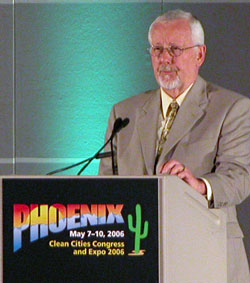 James Boyd is a member of the
James Boyd is a member of the 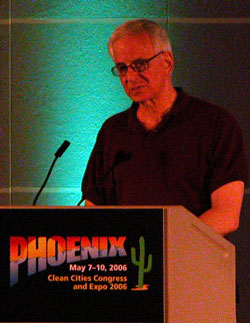 On this morning’s agenda was Dr. Robert Hirsch, Senior Program Advisor, Science Applications International Corporation.
On this morning’s agenda was Dr. Robert Hirsch, Senior Program Advisor, Science Applications International Corporation.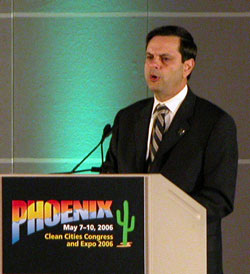 Welcoming everyone to the Clean Cities Congress this morning was
Welcoming everyone to the Clean Cities Congress this morning was 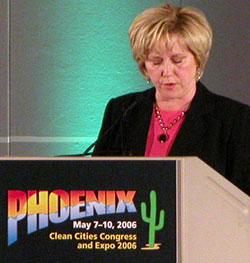 The lady who is making it all happen here in Phoenix is the Executive Director of the
The lady who is making it all happen here in Phoenix is the Executive Director of the  Okay. One more post from this morning’s Senator John McCain speech.
Okay. One more post from this morning’s Senator John McCain speech.
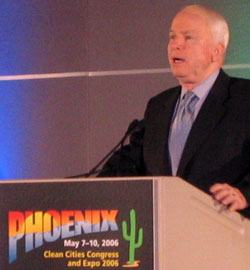 Rather than add this link to the full speech by
Rather than add this link to the full speech by 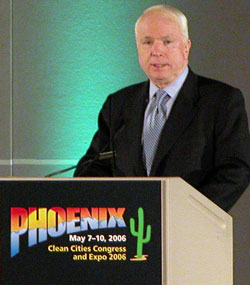 Senator McCain is speaking now and I’ll have his speech here for you in a little while. I’m going to try to get a personal interview with him on his way out too.
Senator McCain is speaking now and I’ll have his speech here for you in a little while. I’m going to try to get a personal interview with him on his way out too. Our opening session is underway. AFVI Executive Director Annalloyd Thomason is speaking right now. She just announced the Domestic Fuel coverage of the Congress. Thank you Annalloyd!
Our opening session is underway. AFVI Executive Director Annalloyd Thomason is speaking right now. She just announced the Domestic Fuel coverage of the Congress. Thank you Annalloyd!